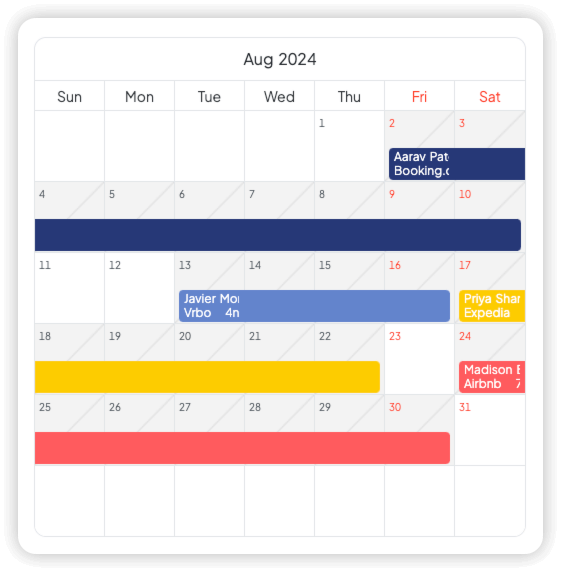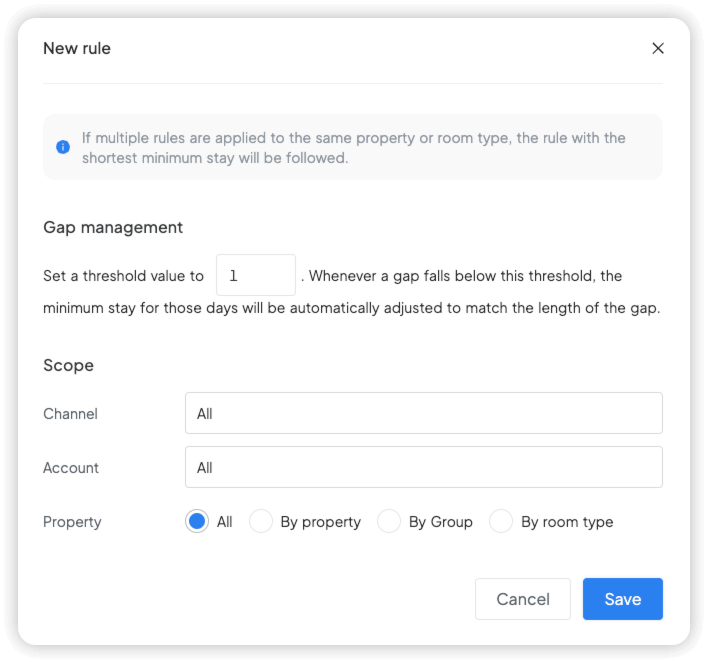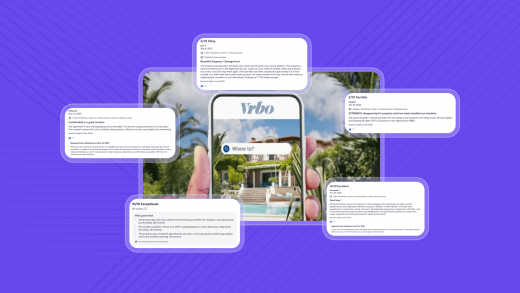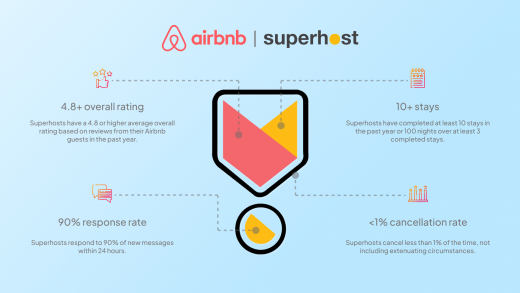Having a jam-packed calendar is perfect for vacation rental hosts – it’s the ultimate goal! But let’s face it, things don’t always go as smoothly as we’d like, and gaps between bookings can throw a wrench in our plans. Owners and managers need to get creative to fill in Airbnb gap days and make sure every day counts for maximum bookings and profits.
In this article, we’ll dive deep into some savvy tips and tricks for tackling gap days, a hot topic for hosts who want to keep their calendars bustling with guests.
What are Gap Days?
Gap Days, also known as “Orphan Days” or “Booking Gaps,” refer to the empty slots that occur between confirmed bookings on a vacation rental calendar. These gaps are typically the result of mismatched booking demand or minimum stay requirements. These vacant periods can lead to revenue loss and increased operational costs, as they represent missed opportunities for potential guests to stay.
For example, in the booking calendar below, August 11th, August 12th, and August 23rd are considered gap days.

How do you fill out the Gap Days in your calendar?
1. Adjust Your Minimum Stay Policy
Setting a minimum stay requirement of three nights for weekends and holidays, or four nights during peak seasons, is an effective strategy used by professional hosts to boost income. However, applying a strict minimum stay policy can almost certainly lead to more Airbnb gap days that are detrimental to your business.
Therefore, Airbnb hosts need to dynamically adjust their minimum stay lengths for different dates based on demand and supply conditions. But this is easier said than done. Executing this on platforms like Airbnb, Vrbo, and Booking.com can be quite a challenge.
You can use Hostex’s automated gap management feature to adjust the minimum stay limits based on the length of gap days. In other words, if you set your property’s minimum stay at five nights, a one-day gap can still be booked.

2. Offer Discounts to Stimulate Bookings
Offering discounts for available nights is a proven strategy to effectively fill the gaps.
- Use social media to reach out to former guests who have booked your property, and try to convert them into loyal return customers with discounted rates.
- Offer discounts to guests making bookings around the gap days, and encourage them to extend their stay with lower rates, which can enhance their overall experience.
- Apply gap day discounts directly on booking platforms. This can improve your property’s search ranking and increase the chances of being booked.
Airbnb Host Jason1967 said:
“We have lake houses not far from where we live. It seems pretty easy to book weekends, but the weekdays are where my gaps exist. I have lowered the weekday prices by about 20% of weekend prices, and that has helped fill weekday gaps. I have also changed to a 1-night minimum on weekdays, and that has helped fill the gaps too. I know we have picked up a lot of guests who are traveling across the country and need just one night.”
3. List Your Property on Multiple Platforms
As the saying goes, “Don’t put all your eggs in one basket.”
Different OTAs (Online Travel Agencies) focus on various aspects and attract different types of guests. Therefore, in addition to Airbnb, consider showcasing your property on platforms like Booking.com, Vrbo, and Expedia. This ensures that all those searching for vacation rentals can see your listing. It’s also one of the most effective ways to increase your bookings and avoid Airbnb gap days.
However, when doing this, make sure to synchronize multiple calendars in real time. You certainly don’t want to receive a full booking and only face penalties due to conflicting reservations.

4. Utilize Last-Minute Bookings
Offering competitive and attractive prices close to the check-in date is a great way to encourage last-minute bookings. After all, a vacant property generates no income. It’s always better to book it out as long as you’re not losing money.
You can achieve automatic price adjustments using Hostex’s automated pricing feature.
For example, if your property is still available 12 hours before check-in, you can reduce the price to 60%. As we mentioned earlier, lower prices will help your listing achieve better search rankings on that day, increasing the chances of being booked.
5. Offer Early Check-In or Late Check-Out Services
If the previous strategies don’t work, consider offering early check-in or late check-out services to guests arriving before or after gap days.
You may charge a reasonable fee to compensate for any lost revenue. Alternatively, you could provide this as a complimentary service to enhance guests’ impressions of your property. This can increase the likelihood of receiving positive reviews, which, after all, can be hard to come by.

Remember, every booking counts, and by staying proactive, you can ensure your property remains a sought-after destination.
With these tips, you’ll be well on your way to reducing gap days and boosting your rental success.



